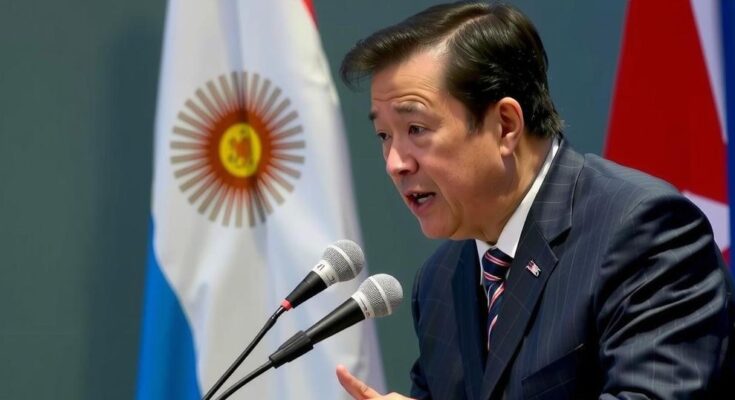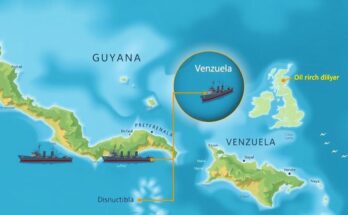Argentina’s President Javier Milei has dismissed Foreign Minister Diana Mondino after the nation voted to support lifting the US embargo on Cuba. This marks a departure from Argentina’s previous foreign policy under the left-wing Peronist government, which had supported Cuba. Milei’s administration has stated it opposes the “Cuban dictatorship” and seeks to promote a foreign policy based on democratic values, potentially altering regional diplomatic relations significantly.
Javier Milei, the President of Argentina, has dismissed his foreign minister, Diana Mondino, following the country’s decision to support the lifting of the United States’ economic embargo on Cuba during a recent vote at the United Nations. Argentina was among 187 nations that voted in favor of a non-binding resolution to repeal the embargo, contrasting the positions of the United States and Israel, which were the only two countries voting against the resolution. This decision marked a significant departure from Milei’s administration, as it was the first occasion Argentina did not align its foreign policy with the US and Israeli governments since he took office. In place of Mondino, President Milei appointed Gerardo Werthein, the Argentine ambassador to Washington, emphasizing Argentina’s unyielding opposition to what they termed the “Cuban dictatorship.” The previous left-leaning Peronist government had fostered strong relations with Cuba, supporting calls to end the embargo originally instituted in the 1960s following Cuba’s adoption of a communist regime. Historically, Cuba has backed Argentina’s claims to sovereignty over the contested Falkland Islands, reinforcing ties between the two nations. The President’s office subsequently articulated the philosophical foundation of Milei’s foreign policy direction, stating, “The country is going through a period of profound changes and this new stage requires that our diplomatic corps reflect in each decision the values of freedom, sovereignty and individual rights that characterize Western democracies.” This statement echoed an explicit condemnation of Cuban governance and articulated a commitment to a foreign policy that denounces human rights violations across the globe. Tensions between President Milei and the foreign ministry have reportedly escalated over various issues in recent months. Despite these tensions, Mondino had been crucial in maintaining Argentina’s public image internationally and often played a pivotal role in mitigating diplomatic fallout resulting from President Milei’s more aggressive rhetoric. The United States instituted the trade embargo against Cuba in 1962 with the aim of overturning Fidel Castro’s socialist policies, but the initiative has not succeeded and remains a contentious topic in Latin American relations.
The article discusses the geopolitical shift in Argentina’s foreign policy following the election of President Javier Milei, who has aligned the nation against the Cuban government in stark contrast to the previous administration’s supportive stance. It highlights the significant implications of Argentina’s vote at the United Nations to lift the US embargo on Cuba, revealing the underlying historical context of US-Cuban relations and the longstanding ramifications of the embargo on regional diplomatic ties. Additionally, the dismissal of Foreign Minister Diana Mondino underscores internal conflicts within the Argentine government regarding their stance towards Cuba and broader foreign policy strategies.
In conclusion, President Javier Milei’s recent dismissal of Foreign Minister Diana Mondino reflects a marked shift in Argentina’s foreign policy towards Cuba, aligning more closely with the interests of the United States and Israel. This decision illustrates the profound changes underway in Argentina’s diplomatic approach, which now firmly opposes regimes perceived as violating human rights, such as Cuba’s government. The transition poses questions about Argentina’s historical alliances and positions within the Latin American community as the government seeks to redefine its international relations.
Original Source: www.bbc.com




